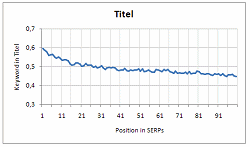
“titel” is “title” in German for you spell check enthusiasts.
Via Axandra Search Engine Facts newsletter, German company SISTRIX (translated link) has conducted a study of 10,000 random keywords and then analyzed the top 100 Google search results for each keyword to determine which page elements offered the most influence on rankings.
Nothing in the analysis will be new to long time search marketers, but since so many people new to search engine optimization ask for nice, concise lists of what’s important to rank well in the search engines, I thought I’d indulge.
- Keywords in the title tag
- Targeted keywords in the body tag
- Keywords in H2-H6 headline tags seem to have an influence on the rankings while keywords in H1 headline tags don’t seem to have an effect.
- Using keywords in bold or strong tags – slight effect
- Keywords in image file names
- Keywords in image alt attributes
- Keyword in the domain name – although, using domain names as link text may explain this
- Web pages that use very few parameters in the URL (?id=123, etc.)
- PageRank
- Inbound links – The top result on Google has usually about four times as many links as result number 11.
Additional notes:
- Keywords in the file name don’t seem to have a positive effect
- The file size doesn’t seem to influence the ranking of a web page on Google although smaller sites tend to have slightly higher rankings.
SEOmoz has also published two surveys of search marketers on their opinions of what on page elements and off page factors are most influential for search engine rankings. Here is version two. I was invited to participate in that survey/study but declined.
I would not personally bank on either study by themselves but rather a combination of both with an emphasis on personal experience, trial/error and real world data analysis. There simply is no substitute for real world insights, practical experience and data.
It is important when using such information with search engine optimization projects to consider them a guide, not as rules. Algorithm chasing puts all your eggs in one basket and is not a sustainable strategy.


